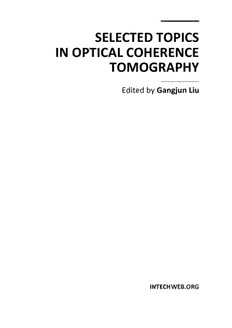Table Of ContentSELECTED TOPICS
IN OPTICAL COHERENCE
TOMOGRAPHY
Edited by Gangjun Liu
Selected Topics in Optical Coherence Tomography
Edited by Gangjun Liu
Published by InTech
Janeza Trdine 9, 51000 Rijeka, Croatia
Copyright © 2012 InTech
All chapters are Open Access distributed under the Creative Commons Attribution 3.0
license, which allows users to download, copy and build upon published articles even for
commercial purposes, as long as the author and publisher are properly credited, which
ensures maximum dissemination and a wider impact of our publications. After this work
has been published by InTech, authors have the right to republish it, in whole or part, in
any publication of which they are the author, and to make other personal use of the
work. Any republication, referencing or personal use of the work must explicitly identify
the original source.
As for readers, this license allows users to download, copy and build upon published
chapters even for commercial purposes, as long as the author and publisher are properly
credited, which ensures maximum dissemination and a wider impact of our publications.
Notice
Statements and opinions expressed in the chapters are these of the individual contributors
and not necessarily those of the editors or publisher. No responsibility is accepted for the
accuracy of information contained in the published chapters. The publisher assumes no
responsibility for any damage or injury to persons or property arising out of the use of any
materials, instructions, methods or ideas contained in the book.
Publishing Process Manager Romana Vukelic
Technical Editor Teodora Smiljanic
Cover Designer InTech Design Team
First published February, 2012
Printed in Croatia
A free online edition of this book is available at www.intechopen.com
Additional hard copies can be obtained from [email protected]
Selected Topics in Optical Coherence Tomography, Edited by Gangjun Liu
p. cm.
ISBN 978-953-51-0034-8
Contents
Preface IX
Part 1 OCT Techniques 1
Chapter 1 Full-Field Optical Coherence Microscopy 3
Arnaud Dubois
Chapter 2 Doppler OCT and OCT Angiography
for In Vivo Imaging of Vascular Physiology 21
Vivek J. Srinivasan, Aaron C. Chan and Edmund Y. Lam
Chapter 3 Phase-Resolved Doppler Optical Coherence Tomography 41
Gangjun Liu and Zhongping Chen
Chapter 4 3-D Ultrahigh Resolution Optical Coherence Tomography
with Adaptive Optics for Ophthalmic Imaging 65
Guohua Shi, Jing Lu, Xiqi Li and Yudong Zhang
Chapter 5 Quasi–Nondiffractive Beams for OCT–Visualization:
Theoretical and Experimental Investigations 83
Larisa Kramoreva, Elena Petrova and Julia Razhko
Part 2 OCT Applications 107
Chapter 6 Neoatherosclerosis Within the Implanted Stent 109
Hironori Kitabata and Takashi Akasaka
Chapter 7 Cellular Level Imaging of
the Retina Using Optical Coherence Tomography 121
Cherry Greiner and Stacey S. Choi
Chapter 8 Spectral-Domain Optical Coherence
Tomography in Hereditary Retinal Dystrophies 147
Isabelle Meunier, Carl Arndt, Xavier Zanlonghi,
Sabine Defoort-Dhellemmes, Isabelle Drumare,
Martine Mauget-Faysse, Benjamin Wolff, Aude Affortit,
Christian Hamel and Bernard Puech
VI Contents
Chapter 9 Study of the Effects of Aging, Refraction
and Intraocular Pressure Levels on Retinal Nerve
Fiber Layer Thickness of Normal Healthy Eyes 171
Maki Katai and Hiroshi Ohguro
Chapter 10 Morphological Changes of Retinal Pigment Epithelial
Detachment in Central Serous Chorioretinopathy 185
Ari Shinojima and Mitsuko Yuzawa
Chapter 11 Clinical Applications of Optical
Coherence Tomography in Ophthalmology 197
Upender K. Wali and Nadia Al Kharousi
Chapter 12 Optical Coherence Tomography in Dentistry 239
Yueli L. Chen, Quan Zhang and Quing Zhu
Chapter 13 Using Optical Coherence Tomography to Characterize the
Crack Morphology of Ceramic Glaze and Jade 261
M.-L. Yang, A.M. Winkler, J. Klein, A. Wall and J.K. Barton
Preface
Optical coherence tomography (OCT) is an interferometric technique based on optical
coherent gating. In OCT, imaging contrast originates from the sample inhomogeneous
scattering properties that are linearly dependent on the sample’s refractive indices.
OCT offers axial resolution of 2‐15 μm and penetration depth around 2 mm. Since its
invention in the late 1980s and early 1990s, OCT has experienced explosive growth in
both technology and application.
With the development of Fourier domain OCT, the A‐line rate and the sensitivity of
the OCT systems have been improved dramatically in the past few years. The
potentials of OCT for real time, in‐vivo diagnostic, surgery guidance and monitoring
applications have been recognized. In recent years, we have seen an increase in the
number of research groups, as well as industry companies, involved in the OCT
system development and application. OCT was first used clinically in ophthalmology,
for the imaging and diagnosis of retinal disease. Recently, it has been applied to image
subsurface structure in skin, vessels, oral cavities, as well as respiratory, urogenital
and gastrointestinal tracts. The application of OCT will continue to penetrate more
exciting fields in the near future.
This book contains different exciting topics in the OCT fields, written by experts from
all over the world. Technological developments, as well as clinical and industrial
applications are covered. Some interesting topics, like the ultrahigh resolution OCT,
the functional extension of OCT and the full field OCT are reviewed, and the
applications of OCT in ophthalmology, cardiology and dentistry are also addressed. I
believe that a broad range of readers, such as students, researchers and physicians will
benefit from this book.
I would like to thank all who made this project possible. Firstly, my sincere
gratitude goes to the InTech staff for inviting me to participate as Editor and for
providing assistance with the editing process, especially to Ms. Romana Vukelic for
her professional assistance throughout the entire process. I also thank all the authors
for generously sharing their knowledge and experience with the readers, and for the
time they have taken to write these chapters. Most importantly, on behalf of the
X Preface
authors and myself, we hope that the readers will download, read and benefit from
this book.
Gangjun Liu
Beckman Laser Institute,
University of California,
Irvine, California
USA

